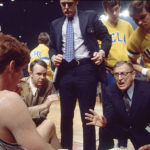John Wooden was the greatest coach of all time. During the last 12 years he was the head basketball coach at the University of California, Los Angeles, his teams won 10 national championships, including seven in a row. He built the model for consistently great leadership while working with teams that turned over one-third to one-fourth of their rosters every season.
Related: Why John Wooden’s Teams Won
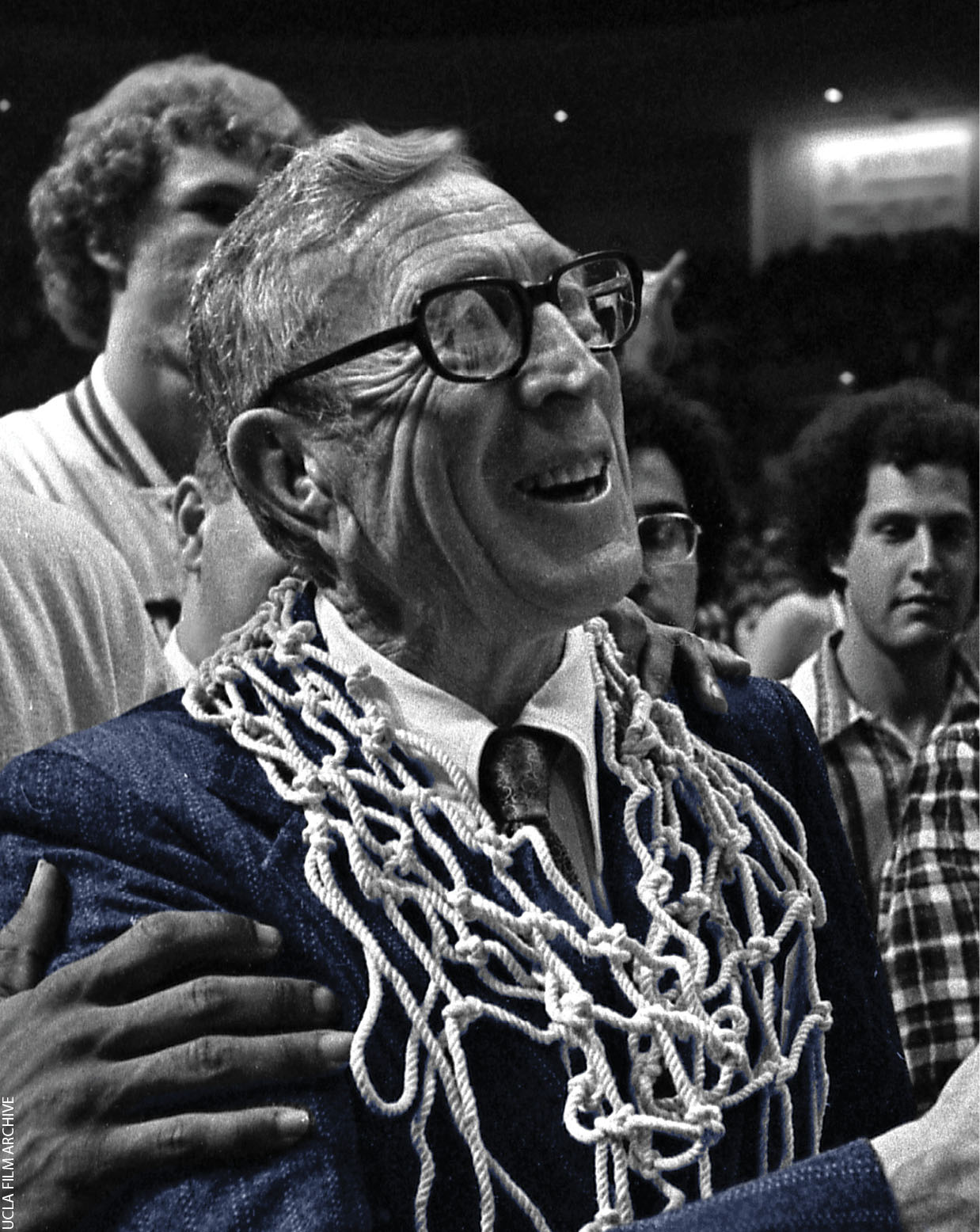
Wooden passed away in 2010, 35 years removed from his last game on the sidelines. But his influence endures. His books, the copies of his Pyramid of Success that hang on walls around the world, the thousands of speeches he delivered, made him a “mentor” to many. But others can look back on a direct relationship where Wooden shaped their lives forever. Here are four essays from people whom Wooden inspired personally:
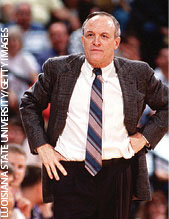 Dale Brown: Three Secrets to Success
Dale Brown: Three Secrets to Success
National Collegiate Basketball Hall of Fame coach Dale Brown spent 25 years at Louisiana State University and twice took teams to the Final Four. He coached some of the greats in the game’s history, including Shaquille O’Neal.
The moment I was hired at LSU in March 1972, I immediately told myself, This is my first college head coaching job, and I can’t blow it. I needed to reach out to the very best people I could in all walks of life to see if I could come ask them some questions about how they became successful and how they maintained that success. I didn’t want to only speak to people in sports, so I decided to ask the very best in the worlds of entertainment, positive thinking and motivational speaking.
When it came to basketball, only one name was on the list: John Wooden. He immediately invited me to his house for a few days. In preparation, I decided I couldn’t waste this man’s time; I had to have something organized. So I went to the alphabet. I took a yellow legal pad and thought, What can I talk to him about that starts with the letter A? What does he consider achievement? The first thing that he told me was: We should never mistake activity for achievement. There is nothing worse than activity that accomplishes nothing. Next I talked to him about attitude—the attitude of his players, his attitude toward his assistant coaches, and the pressure of winning and dealing with the media and problems that might occur with his players off court. I took notes like a madman because I didn’t bring a tape recorder; I thought it would be rude.
Then I went to B. I asked about bulletin boards. Did he have them, and if so were they to motivate or to instruct? Did he put something up every day?
Then C. Which coaches did he admire and why? Correspondence: Did he handle all of his correspondence? Did he type it or did he handwrite it? Did he have a secretary do it? He told me he answered every letter that he received if he knew who it was from, and most of the time by hand. Occasionally when time was short, he had it typed.
The first day I arrived to his modest home at 8 in the morning. About 6 p.m. I felt like I was imposing upon him. So I said, “Coach, I have taken enough of your time. I am sure you are tired, so I will see you tomorrow.”
He immediately said, “No, Dale. Sit back down, I am not tired. We will continue.” We went to 10:30 p.m. He never seemed to tire.
I went all the way through to Z—notebooks and notebooks full of wisdom.
The last day I was there I wanted to thank him for being so gracious. He came out to my car and walked up to me. He said, “Dale, I am really glad that we had a chance to bond. It was a delightful time, but you could have saved LSU some money and yourself some time. All those pages of notes that you took… there are really just three secrets.” I had already closed my trunk and didn’t want to open it to grab a pad and pen, but I was desperate to do so thinking, Here it comes, here’s the magic.
He said, “The three things that I am going to tell you are fairly simple if you want to be successful. First, make certain that you always have better players than anybody that you play. Make sure you always get those better players to put the team above themselves; that is imperative. Finally, don’t try and be some coaching genius or guru. Don’t give your players too much information. Remember there are only five variables or players on the court. Always practice simplicity with constant repetition.”
As I began my career, I kept going back to those three things in my mind. Obviously we all want great players, but finding the ones who think team first—that’s a challenge. I had to remember that he said to practice simplicity. Most coaches want to be known for their genius, for some strategy that changed the game. But he wanted to be known for keeping it simple.
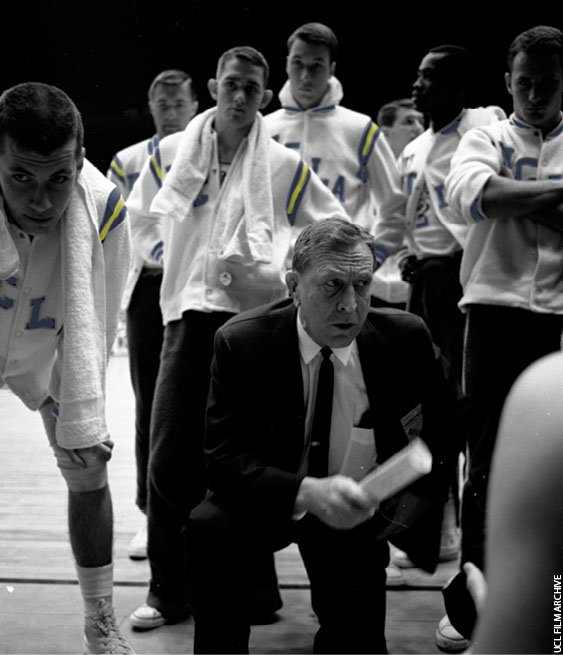
From the first time that I met him, I knew he would be my life’s most significant mentor. I saw how he greeted people in restaurants, how humble he was. There was no question he could have been just as happy as a high school coach in Indiana. He was a teacher, always ready to help someone. His number was listed in the phone book. You didn’t have to be a celebrity to enter his home. I remember one time we were there, and a junior high school coach from some place in the Midwest called and came over. Wooden treated that guy with such dignity, asking so many questions and complimenting him to reinforce a lot of the things the coach was doing. I can only imagine the coach flew home on cloud nine.
John Wooden is a legend in basketball, but more important, he is a legend in serving mankind. He was a master teacher and mentor to so many of us.
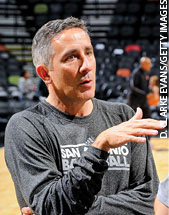 Chip Engelland: Focus on the Details
Chip Engelland: Focus on the Details
San Antonio Spurs assistant coach Chip Engelland is known as “the shot doctor,” a coach who works with players to develop and improve their mechanics. Though Engelland grew up in California, he played college basketball at Duke University in North Carolina. He says that his desire to coach came through his experience as a ball boy for Wooden’s UCLA team.
My first interaction with Coach was at the John Wooden day camp at Palisades High School. It was an incredible opportunity to learn and as a young guy—I think I was a fifth-grader—I remember being amazed that Coach Wooden was there every day. On the third day, my parents were running late dropping me off. At 9:05 a.m. the locker room was empty.
I turned a corner, and I ran right into Coach Wooden. He gave me an intimidating stare and said, “Why are you late?”
I said, “Coach, my mom just had a baby.” It wasn’t true, but I had no idea what to say. I was scared to death, and I had to come up with a good excuse.
“A baby?” he said as he patted me on the back. “That’s the best excuse I have ever heard. Now go on and have a great time, and remember the importance of being on time.”
What a lesson. Yes, I was wrong, but he handled it with graciousness and used it to teach me a life lesson.
When you studied him from afar, there was a seriousness about him, but in a situation like that, he got a kick out of it and reacted with just the right touch. I will always remember that.
A few years later, I heard they were interviewing young people to be ball boys for the UCLA team. Coach wasn’t part of the interviews, but you could feel him in the process. Some might think this was “just a ball boy” position, but at UCLA it was important that everything was precise. Your hair couldn’t touch your ears; you had to wear a white shirt with blue corduroy pants or slacks. There was a certain protocol that you had to follow, just like the players.
Details, details, details. Every detail was considered, even down to how we conducted ourselves as ball boys.
I’ve had the chance to be around some great coaches, and they all have this attention to detail in common. To be successful year in and year out, you have to make everything make sense to a collection of people with very different personalities and talents. If you look at Bill Walton and the Spurs: Tony Parker, Tim Duncan and David Robinson are all strong individuals with strong individual beliefs, but they knew when to put those beliefs aside for the good of the team. Getting that to happen is the beauty of coaching a team sport. Coach Wooden loved that part; you could see and feel it.
Another thing I watched and learned from him was poise. My definition of poise is “calm under pressure,” and it was a big deal to Coach to think calmly when things were a little chaotic. Few people have ever done that better, and it wasn’t some kind of front. He was able to be calm because he was so well prepared. By thinking through situations in advance, he was able to know how he should react. That produced calm.
There are so many ways Coach Wooden impacted who I am today and who I will be tomorrow.
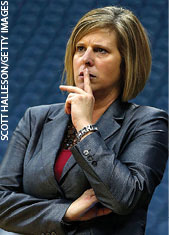 Cori Close: It’s About More Than Trophies
Cori Close: It’s About More Than Trophies
Every day, current UCLA women’s basketball coach Cori Close walks by a wall that celebrates Wooden. The inspiration she derives from that wall and the coach’s quotes are more impactful because she spent time learning at Coach Wooden’s knee years ago.
I was an assistant coach at UCLA in 1994, when one of the men’s team assistants, Steve Lavin, reached out and said, “Let’s go see Coach Wooden.” I remember being so excited, but scared, too. The idea of seeing him face to face was intimidating. I tried to make every excuse that I could to avoid going.
I’m glad Steve didn’t let me miss that moment. We walked in and Coach greeted Steve, then looked up and very politely said, “Who are you?” I said, “Hi, I’m Cori.” He stopped, looked at me and asked how I spelled my name. When I sheepishly told him, he said, “I want to show you something.” He walked me around the corner to his den, and there in front of us was a little stool with his great-granddaughter’s name carved in it. He said, “You are the first person I have ever met who spells your name like my great-granddaughter Cori.”
From then on, I joked that he wouldn’t have invited me in if my name was spelled traditionally, C-o-r-e-y. Of course he would have been that gracious no matter how my name was spelled, but that was one of my great early lessons from Coach Wooden: Find a way to connect to everyone. He found a way to make everyone feel comfortable in his presence.
From that point on, I pretty much went back every other Tuesday for the rest of my time as an assistant at UCLA, and then I continued to come back once a month, even after I went to coach at the University of Santa Barbara. That went on for nine straight years. I was just really thankful that he let me in.
During our time, I asked him so many questions about our profession. One of the most profound things he taught me was how he made really complicated things very simple. Many of us, myself included, overthink things. Sometimes I’d bring what I thought were problems to him and he’d ask a couple of simple questions, and then ask me, “What are you committed to? Know who you are. Stick to your principles, make choices that are in line with your principles, and deal with the results.”
I remember saying to myself, Can it really be that simple? But in the end I know that is exactly how he became the greatest coach of all time. He knew what he was committed to, and he brought everything back to what he stood for—that became a lesson I aspired to model.
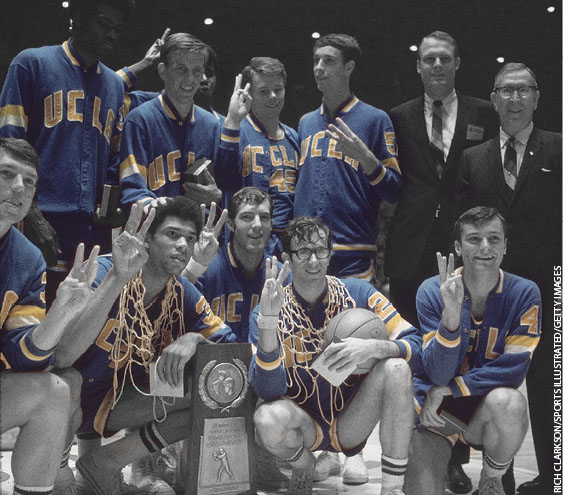
Another lesson he offered was to not try and be someone else. I sometimes would ask how he would handle something I was dealing with and he would say, “I don’t want you to do it like me; I want you to find what works for you and do that.” Many of us want to find someone successful—mine was John Wooden—and try to copy that person. He said that was a huge mistake. Study their principles, he said, but build your own.
What strikes me most about Coach Wooden was that, besides winning games, what he really did was help build amazing men. We once had a visitor who was part of a charity we supported. I didn’t know who the guy was, but he said to me, “I’ve been married for 38 years because of what Coach Wooden taught me. I have opened three successful businesses because of what he taught me. I have conquered cancer three times because of what he taught me. I even survived the death of my 12-year-old daughter because of the tools that he gave me. I am the man I am because of UCLA Basketball and what Coach Wooden taught me, and you now have this chance to shape young women. I’ll be cheering for you.”
The man was John Vallely, starting guard on two of UCLA’s championship teams, who went on to play two years in the NBA. He shared that Coach stayed invested in him for many, many years after he was no longer playing at UCLA. Lots of coaches talk about staying in touch—John Wooden did it. Coach taught Vallely what true loyalty was. He reminded me it was just not enough to have trophies and win championships; we have to shape others.
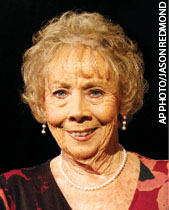 Nan Wooden: Connect With Others Totally
Nan Wooden: Connect With Others Totally
Nancy Wooden Muehlhausen is one of Wooden’s two children. For the last 25 years of his life, after the passing of his wife, Nellie, Wooden leaned on Nan.
I know I have nothing to compare it to, but it was pretty special having the daddy I had. All of those inspirational quotes you read, all the stories you’ve heard about how he lived his life and worked, I watched it firsthand. If experience is an amazing teacher, I learned from the best.
Maybe the greatest lesson he taught me was the importance of always being gracious, because you never know who you have a chance to influence. After Mother passed away, I became his escort to places, and we did a lot of things together. For years I would get annoyed at him because no matter where we went, people just wouldn’t leave him alone, and he wouldn’t stop it.
Over the years I grew to understand that his connection to people is part of what will remain long after his passing. He was never too big or too busy, and he made people feel special.
Ironically now that he has passed, I get asked to do events as his daughter, and people ask me for a picture. I know that somewhere up there, my daddy is laughing. He’s watching me learn to be as patient as he was, and he’s got to be wondering why it took me so long to wise up. He always said I was a work in progress, and I keep proving him right.
This may be true of other people, but in my lifetime I’ve never met anyone like my dad in this way: If you were with my dad, then he was with you totally. His mind wasn’t thinking of other things. He was all ears to them, never impatient. That is a real talent. He really was interested in everybody.
One aspect of Daddy’s life that not everyone got to experience was his sense of humor. I’ll never forget one time, a few years after my mom passed, that he gave a speech at a hotel, and I went with him. We went to check in, and we had made the arrangement to have adjoining rooms.
The manager thought I was his wife and said, “Oh, Coach, it is so great to have you both here. It is going to be wonderful, and I have a really beautiful king-size room for you with a big king-size bed.” So I said, “Oops, hold on a minute. We are supposed to have adjoining rooms.” Daddy stood there, head down and said, “Gosh, she has been mad at me for two weeks. I don’t know when she is going to get over this.”
One of Daddy’s favorite sayings was “the worst thing parents can do for their children are things they should and could do for themselves.” He made it a big point for us to learn how to handle situations early.
On the flip side, he often said, “The best thing a father can do for his children is to love their mother.” His love for my mother was unlike anything you can imagine. After she died, he would write love letters to her every month and place them on her side of the bed. We knew, even as kids, that what they had was special.
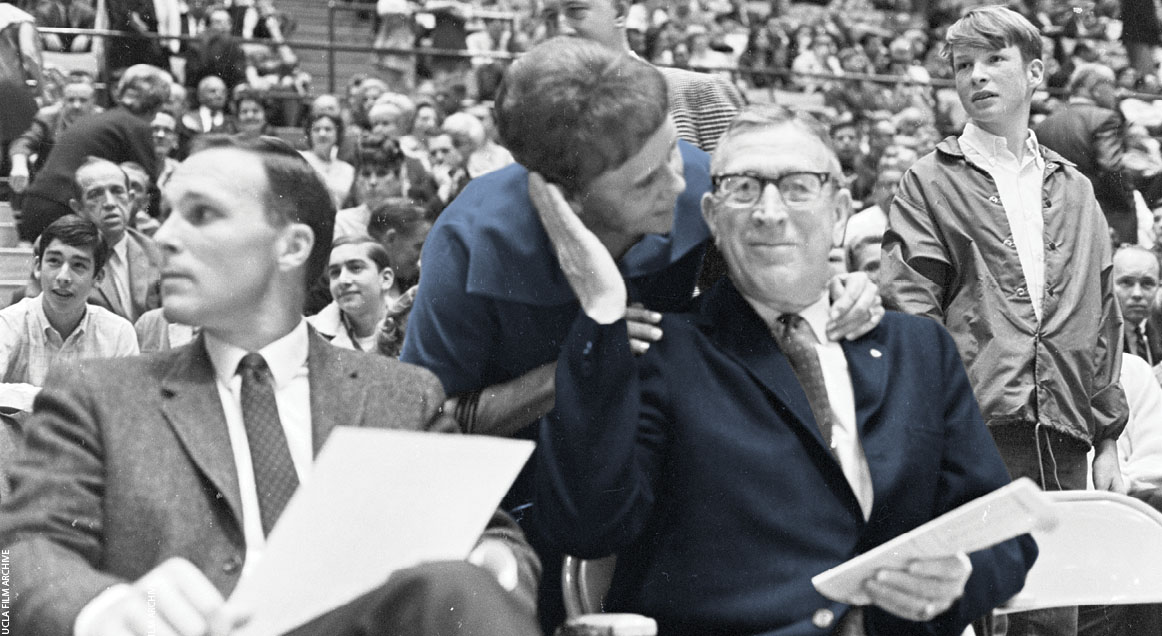
He didn’t let anyone read those letters, but I actually found one that was stuck in a book that I brought home. I will never show it to anyone else, but the way he expressed his love for my mother was incredible.
When he was in the hospital for the last time and knew he was going to die, he asked that he get a good shave. He was dying, and he wanted to be shaved because he wanted to look his best when he saw her in heaven.
This article appears in the March 2016 issue of SUCCESS magazine.





